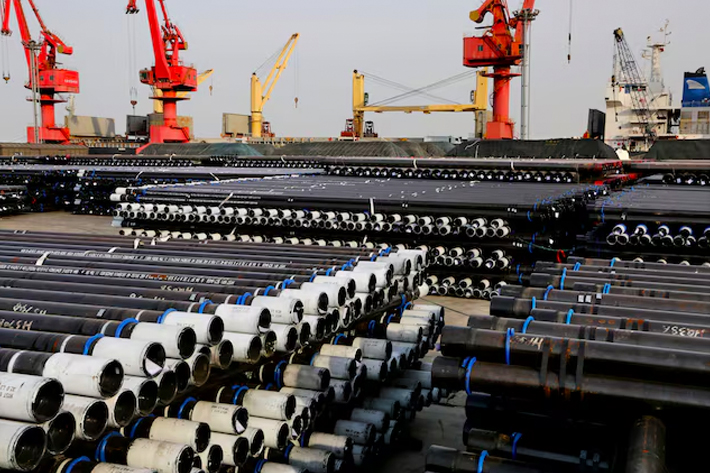China’s announcement last week on ending export tax rebate on some products is leading the country’s exporters to raise prices of a wide range of products — from aluminium goods to used cooking oil and solar power gear.
The world’s second largest economy said on Friday that, starting December 1, it will reduce the export tax rebate rate for some refined oil products, photovoltaics, batteries and certain non-metallic mineral products from 13% to 9%.
It said it will also cancel the rebate for aluminium and copper products and for chemically modified animal, plant or microbial oils and fats, including used cooking oil (UCO).
Also on AF: Retaliatory Trade Tariffs Could Backfire on Asia, IMF Warns
The VAT refund acts as a financial life-line for many smaller product manufacturers in a ferociously competitive market. Its removal means exporters of affected products will look to pass on the cost by raising prices and renegotiate contracts, traders and analysts said.
Metal exporters could rush through exports before the December deadline while UCO exporters may delay shipments to renegotiate contracts, analysts and company officials said.
“For December-loading UCO, export shipments could be delayed or cancelled due to the policy change as parties will seek to renegotiate contracts,” Ye Bin, chairman of Chinese UCO exporter Sichuan Jinshang, told Reuters.
Aluminium markets upheaval
China is the world’s biggest aluminium producer and a major exporter of semi-finished aluminium used in everything from transportation to packaging.
And almost all the aluminium products exported by China will be affected by the tax change. From January to September this year, China exported 4.62 million metric tons of the kinds of aluminium products that will be affected.
“The cancellation of tax rebate for aluminium products will lift costs of exporters, curbing their interest in shipping cargoes abroad,” analysts at consultancy Shanghai Metals Market (SMM) said in a note on Saturday.
Beijing’s announcement on Friday drove up aluminium prices on the London Metal Exchange and US soyoil prices as traders worried it may curb Chinese shipments abroad. But prices cooled off on Monday.
Demand unlikely to be hit
The tax change comes at a time when Western countries have repeatedly accused China of unfairly subsidising its aluminium and steel sectors, saying the country’s excess capacity is swamping global markets.
However, a Singapore-based aluminium trader said the overseas market will still need Chinese cargoes, even at a higher cost, to fill a supply gap.
“Domestic prices may fall another 2%-3% to offset the loss for aluminium exporters,” added the trader who asked not to be named as they are not authorised to speak to the media.
Citi analysts expect the tax change to have a smaller impact on copper products as export volumes are smaller, at about 800,000 metric tons a year, and some of the products are made under tolling services which would not be affected.
Zhao Yongcheng, principal analyst at Benchmark Minerals Intelligence (BMI), said Beijing’s move was partly to ensure sufficient domestic copper supply, and to encourage producers to use imported copper ore to make higher-value-added goods.
The previous tax rebates had encouraged exports of low-value-added copper products, which was “equivalent to wasting valuable imported resources”, Zhao said. China is a big importer of copper.
“It will definitely accelerate the integration of copper fabricators, eliminating some out of the market,” Zhao added.
Solar and fuel impact
The tax change also comes as China grapples with excess refining capacity, as well as lacklustre and volatile domestic demand.
“This is going to hit (refined fuel) export margins,” a state oil official said, estimating margins would fall by 200-300 yuan ($27.62-$41.43) per ton.
Citi analyst Oscar Yee said in a note that the tax change will reduce revenues for state refiners Sinopec and PetroChina, and should cap fuel exports from China, which could support refiners’ margins elsewhere in Asia.
In October, China’s refined products exports fell to their lowest levels in 18 months amid weak export margins.
Bi Xinxin, a managing consultant at energy consultancy Wood Mackenzie, expects Chinese oil majors to continue exports if margins are healthy and if they have sufficient export quotas in the long run.
For the solar sector, which is struggling with overcapacity, the downward tax adjustment could result in a 0.02-0.03 yuan-per-watt increase in solar module prices for overseas buyers, Citi analyst Pierre Lau said in a note.
Chinese solar modules would remain competitive even with the price increase, as the cost would be passed on to end-users overseas, Lau said.
That will mean limited impact on the earnings of Chinese solar equipment exporters such as Longi Green Energy, he said.
- Reuters, with additional editing by Vishakha Saxena
Also read:
China Pushing For a Bigger Say on Prices of Global Metals
Chinese Solar Giants’ Profits and Revenue Plunge in First Half
Solar Overcapacity Kills Projects, Fuels Bankruptcies In China
China Tightening Grip on Critical Minerals For Chips – NYT
China to Curb Exports of Antimony Metals, Ores, Oxides – SCMP
China’s Critical Minerals Blockade Risks Global Chip Shortage
China’s New Rare Earth Rules Seek Product Traceability Details
China Curbs The Export of Rare Earths Processing Technology
China Turns Focus on Rare Earths Sector Amid Trade War
Western Firms Struggling to Break China’s Grip on Rare Earths
China Metal Curbs, Rare Earths Risks Fuel Hunt For Safe Sources























